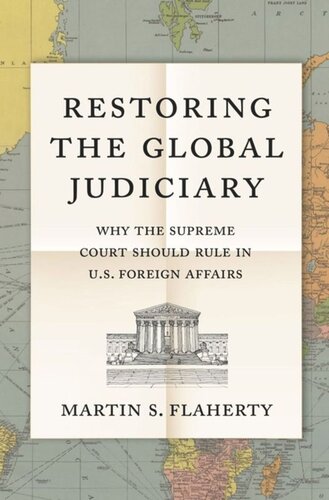

Most ebook files are in PDF format, so you can easily read them using various software such as Foxit Reader or directly on the Google Chrome browser.
Some ebook files are released by publishers in other formats such as .awz, .mobi, .epub, .fb2, etc. You may need to install specific software to read these formats on mobile/PC, such as Calibre.
Please read the tutorial at this link: https://ebookbell.com/faq
We offer FREE conversion to the popular formats you request; however, this may take some time. Therefore, right after payment, please email us, and we will try to provide the service as quickly as possible.
For some exceptional file formats or broken links (if any), please refrain from opening any disputes. Instead, email us first, and we will try to assist within a maximum of 6 hours.
EbookBell Team

4.7
46 reviewsAn exploration of the how the Supreme Court's role in foreign affairs has dimished since the founding--and an argument for why it must be more robust
A historical, international relations, and legal reassessment for why there should be a larger judiciary role in American foreign relations
In the last several decades, there has been a growing chorus of voices contending that the Supreme Court and federal judiciary should stay out of foreign affairs and leave the field to the Congress and president. Challenging this commentary, Restoring the Global Judiciary argues instead for a robust judicial role in the conduct of U.S. foreign policy. With an innovative combination of constitutional history, international relations theory, and legal doctrine, Martin Flaherty demonstrates that the Supreme Court and federal judiciary have the power and duty to apply the law without deference to the other branches.
Turning first to the founding of the nation, Flaherty shows that the Constitution’s original commitment to separation of powers was as strong in foreign as domestic matters, not least because the document shifted enormous authority to the new federal government. This initial conception eroded as the nation rose from fledgling state to superpower, fueling the growth of a dangerously formidable executive that today asserts near-plenary foreign affairs authority. Flaherty explores how modern international relations makes the commitment to balance all the more critical and he considers implications for modern controversies that the judiciary will continue to confront.
At a time when executive and legislative actions in the name of U.S. foreign policy are only increasing, Restoring the Global Judiciary makes the case for a zealous judicial defense of fundamental rights involving global affairs.